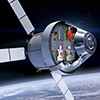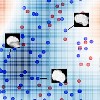
Emphasis
The emphasis is on using biomedical information to achieve better health outcomes and smarter health care. Examples of technical development areas in this program include but are not limited to informatics tools and resources such as: databases, standards for enhanced interoperability, collaborative analysis environments, data modeling and representation, and techniques for the integration of heterogeneous data, rational data-driven design of experiments, visualization of data, and digital representation of rich qualitative data. This program is intended to support NIBIB’s other program areas in biomedical imaging and bioengineering research.
Program priorities and areas of interest:
- Biostatistics methods for bioinformatics
- Meta databases and integrative services
- Digital biomarkers
- Information-driven computer-aided diagnosis, and decision support system
- Digital atlases
- Data mining
- Large scale biomedical image/information databases
- Data fusion
- Hyperspectral data analysis and -omics
Additional support
This program also supports:
- Early-stage validation of tools for biomedical informatics
- Image-based search
- RIS/PACS system
- Health outcome-based assessments
Related News

One day, the ultrasound equipment that health care professionals use for essential diagnostic imaging may no longer be confined to the clinic, instead operated by patients in the comfort of their homes. New research marks a major step toward that future.

When it blasts off from the Kennedy Space Center in Florida, Artemis I will carry two anthropomorphic mannequins strapped into its crew module. The mannequins are part of a project aided by a team of Duke University bioengineers with support from NIBIB.

A change of instructions in a computer program directs the computer to execute a different command. Similarly, synthetic biologists are learning the rules for how to direct the activities of human cells.

NIBIB-funded researchers at Stanford University have created an artificial neural network that analyzes lung CT scans to provide information about lung cancer severity that can guide treatment options.

